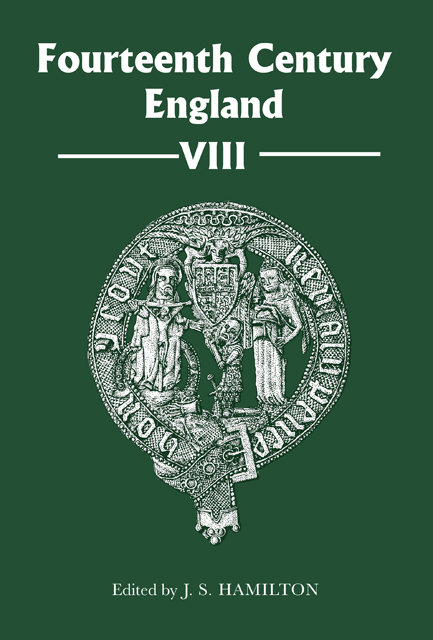Book contents
- Frontmatter
- Contents
- Contributors
- Preface
- Abbreviations
- King's Armourers and the Growth of the Armourer's Craft in Early Fourteenth-Century London
- In the Best Interest of the Queen: Isabella of France, Edward II and the Image of a Functional Relationship
- The First Entry of the Bishop: Episcopal Adventus in Fourteenth-Century England
- Temporalities Be Taken: Edward III, Unruly Ecclesiastics and the Fight for the Benefices of Exeter, 1337–60
- The Armour of Sir Robert Salle: An Indication of Social Status?
- Richard II, the Mortimer Inheritance and the March of Wales, 1381–84
- War, Chivalry and Regional Society: East Anglia's Warrior Gentry before the Court of Chivalry
- A ‘Sterre of þe See to ȝyue Lyȝt to Men’ and ‘Myrroure to Alle Sinful’: A Comparative Analysis of Biblical Women in the English Wycliffite Sermons with John Mirk’s Festial
- Index
- Fourteenth Century England issn 1471–3020
In the Best Interest of the Queen: Isabella of France, Edward II and the Image of a Functional Relationship
Published online by Cambridge University Press: 15 February 2023
- Frontmatter
- Contents
- Contributors
- Preface
- Abbreviations
- King's Armourers and the Growth of the Armourer's Craft in Early Fourteenth-Century London
- In the Best Interest of the Queen: Isabella of France, Edward II and the Image of a Functional Relationship
- The First Entry of the Bishop: Episcopal Adventus in Fourteenth-Century England
- Temporalities Be Taken: Edward III, Unruly Ecclesiastics and the Fight for the Benefices of Exeter, 1337–60
- The Armour of Sir Robert Salle: An Indication of Social Status?
- Richard II, the Mortimer Inheritance and the March of Wales, 1381–84
- War, Chivalry and Regional Society: East Anglia's Warrior Gentry before the Court of Chivalry
- A ‘Sterre of þe See to ȝyue Lyȝt to Men’ and ‘Myrroure to Alle Sinful’: A Comparative Analysis of Biblical Women in the English Wycliffite Sermons with John Mirk’s Festial
- Index
- Fourteenth Century England issn 1471–3020
Summary
Recent scholarship on medieval queenship has developed a paradigm for the relationship between the late medieval king and queen. In this paradigm, the office of queenship is an essential part of the crown and of the king’s exercise of sovereignty. Both the king and queen benefited from this relationship, with the queen actively involved in creating, upholding and performing the roles of queenship (intercession, motherhood, patronage and so on), and the king manipulating them to legitimize and strengthen his own rule. In this way, a partnership, albeit an uneven one, was created for the benefit of the crown.
Surprisingly, this very paradigm of a functional, royal marriage can be found in one of the most notoriously dysfunctional marriages in late medieval history – that of Edward II, king of England, and his queen, Isabella of France. If we focus on the more salacious aspects of their marriage, it becomes clear why it is often viewed as highly ineffectual. Isabella married Edward II at Boulogne-sur-Mer in 1308 and from the beginning their marriage was plagued with conflict. Edward II had a penchant for favouritism, and so he bestowed his patronage on his friend Piers Gaveston. The nobility of England reacted in 1311 by drawing up a list of Ordinances by which the king was to abide. One of these Ordinances required Gaveston’s exile, his third exile since 1307. However, he returned to England sometime between December 1311 and January 1312. Edward II, Gaveston and Isabella fled north to avoid the nobility’s anger, but in the summer of 1312 Gaveston was captured and murdered. It was not long before Edward found a new favourite, Hugh Despenser, the younger, and once again the nobility called for the favourite’s exile. Their request was granted, but it did not prevent civil war from breaking out in 1321. Hugh Despenser returned from exile shortly thereafter. Relations between Edward and Isabella deteriorated quickly and Edward seized all of Isabella’s lands, granting them to Despenser in 1324.
In 1325, despite these strains in their marriage, Edward sent Isabella as an ambassador to the French court to defend English interests in the disputed territory of Gascony.
- Type
- Chapter
- Information
- Fourteenth Century England VIII , pp. 21 - 42Publisher: Boydell & BrewerPrint publication year: 2014



